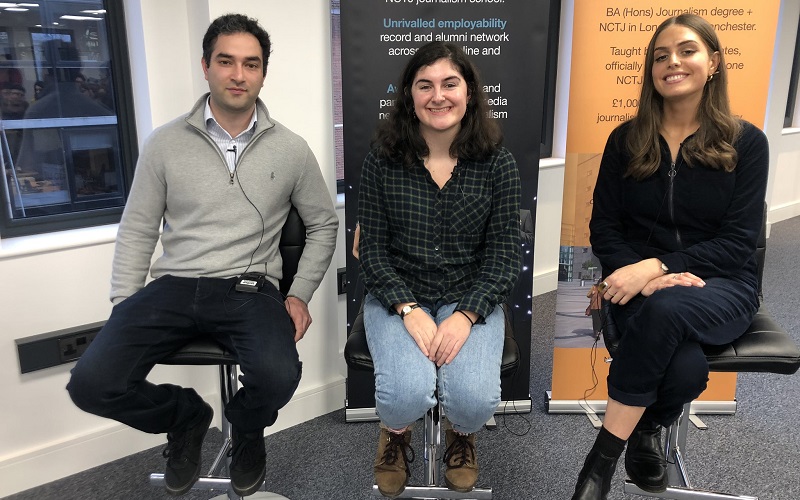News Associates presents JournoFest 2020: News Associates graduates – where are they now?
Taking the first steps of your journalism career can be daunting, but a panel of News Associates graduates shared some tips, writes News Associates part-time trainee George Ramsey.

L-R: News Associates graduates Basit Mahmood, Anahita Hossein-Pour and Laura Fitzpatrick
As Metro journalist and News Associates 2018 part-time graduate Basit Mahmood discovered, you might even find yourself sitting opposite seasoned columnists very early on.
In his case it was the Mail on Sunday‘s Peter Hitchens.
“It took me a very long time to get my confidence. I thought I was out of my depth,” Basit recalled.
“It does take time but you’ve got to get a feel for the kind of stories [your newsroom] is interested in … what kind of stories do well for their particular audience. I started pitching and got more and more confidence.”
“I created a barrier for myself initially by not being confident enough,” said @BasitMahmood91.
— News Associates (@NewsAssociates) January 25, 2020
“Confidence does take time. But slowly but surely it will come along.” #TeamNA #StartedHere #JournoFest pic.twitter.com/IpAhd9jcK9
Anahita Hossein-Pour, a News Associates 2017 fast-track graduate, finds pursuing original stories the most rewarding part of her job at PoliticsHome.
“Speaking to people face-to-face and the grassroots stuff, getting the original stories and the real life stories and empathy – that appealed a lot more to me than following my initial interest in geo-politics, and China versus Trump, that sort of thing,” she said.
“My @NCTJ_news training gave me the confidence to get a job in a newsroom,” said @anahitahpour. 😊#TeamNA #StartedHere #JournoFest pic.twitter.com/X41w0sgb9H
— News Associates (@NewsAssociates) January 25, 2020
The time between graduating and landing your first job can be nerve-wracking. The advice from News Associates 2016 fast-track graduate Laura Fitzpatrick, who started at The Telegraph before moving to the BBC, is to persevere.
“We all put a lot of pressure on ourselves to make sure we got out and got a job, but just keep going and you’ll find the right thing for you,” she said.
Basit, who worked as a freelance writer and at a local paper before joining Metro, explained how he was prepared to submit work for free. He set a limit of three months, after which he chose only to accept paid work.
Lots of emphasis on the importance of a good portfolio! #TeamNA #StartedHere #JournoFest pic.twitter.com/YMyqGuZBhc
— News Associates (@NewsAssociates) January 25, 2020
Laura, on the other hand, advises against it.
“I think working for free is a bit of a scandal,” she said.
“I remember doing my NCTJ and I kept saying to people: ‘Stop giving people stories for free!’ If you’ve worked really hard to get a really good case study and you’ve got someone to speak to you for ages and you’ve put in so much work, you should get paid for that.”
She added, however, that work experience can be valuable: “It’s the only reason I’ve ended up getting some of the jobs that I have and that is working for free,” she explained.
“If you’re working really hard and getting the bylines, if you’ve got a little bit to show for yourself, then you’re good enough to get paid for it.”
Did you miss JournoFest 2020? Check out our round up video below! And learn more here.


